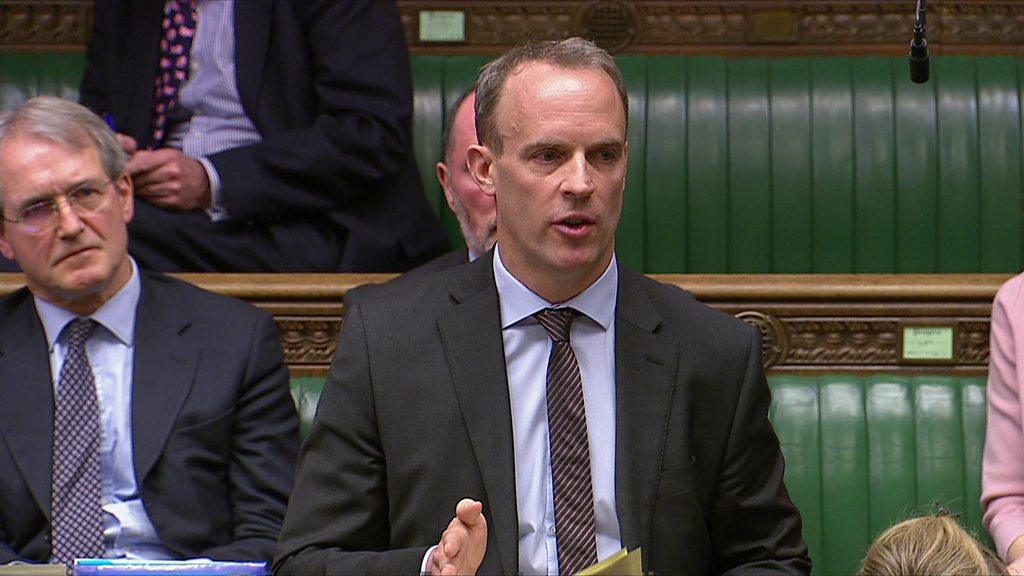Brexit: Did Dominic Raab warn of no-deal during referendum campaign?
- Published
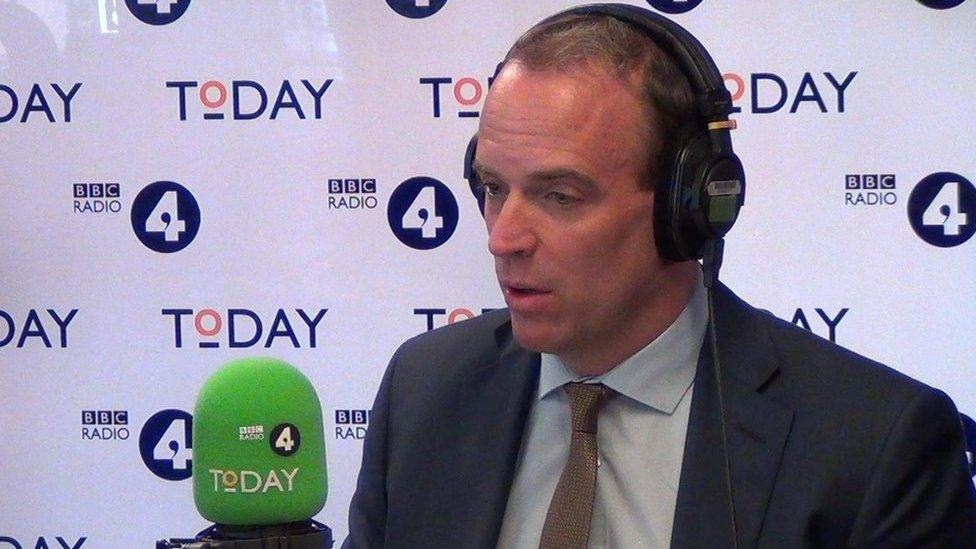
Foreign Secretary Dominic Raab claimed that he had talked of the possibility of a no-deal Brexit during the referendum campaign in 2016.
"We made clear - those in the campaign - that we should strive for a good deal but, if that wasn't available, that we should go on and make a success of Brexit," he said
"I was questioned on it by the BBC almost every time I appeared and so was Michael Gove… There's all sorts of interviews which said that of course we'd prefer a deal, but that there would be a risk," Mr Raab told the BBC on Monday.
This was in response to presenter Mishal Husain asking him whether the 2016 vote had given the government a mandate to leave without a deal.
Deal or no deal?
Mr Raab, a prominent campaigner for Vote Leave, repeatedly said during the campaign that there was no doubt that the UK would get a deal with the EU.
The closest we have been able to find to an acceptance that there might not be one was on 2 March 2016. That was the day the Treasury released a report looking at a number of Brexit scenarios, external and concluding that a no-deal or "WTO Brexit" was the most damaging option for the UK economy.
A WTO Brexit would mean trading on rules set by the World Trade Organization.
On BBC 5 Live Breakfast that day, Mr Raab initially said "there would be a free trade agreement". When pressed on the risk of a WTO Brexit, he repeated that it was unlikely because EU barriers to trade would "hurt them far more" and added: "That's the worst case scenario - average tariffs of 3.6%."
Mr Raab has since pointed to this appearance on BBC Radio 5 Live, and also to a David Davis speech to the Royal Institution of Chartered Surveyors where his fellow Leave supporter "talked in detail about it".
Mr Raab argued that "all eventualities" including a no-deal Brexit had been discussed during the referendum.
After days looking through the archives, we have not been able to find any other clear examples of Mr Raab talking about the possibility of a no-deal exit before the referendum on 23 June 2016. Channel 4 News, external and The Guardian, external both came to the same conclusion.
BBC Reality Check searched for mentions of no deal in:
BBC programme running orders and transcripts
Today programme interviews
Vote Leave's campaign material
Texts of keynote speeches
Articles written by Mr Raab and Mr Gove
There are plenty of examples of him saying the UK would secure a deal, on the other hand.
'New deal'
In March 2016, Mr Raab told the BBC that there was "no doubt" the UK would negotiate a new agreement with the EU.
"We're the fifth biggest economy in the world. European firms sell us £59bn more than we sell them. Of course we'd strike a new deal, and relatively soon, with transitional arrangements if necessary," he said.
That April, he said that mutual self-interest suggests "we'd cut a very good deal and it's certainly not in the Europeans' interest to erect trade barriers".
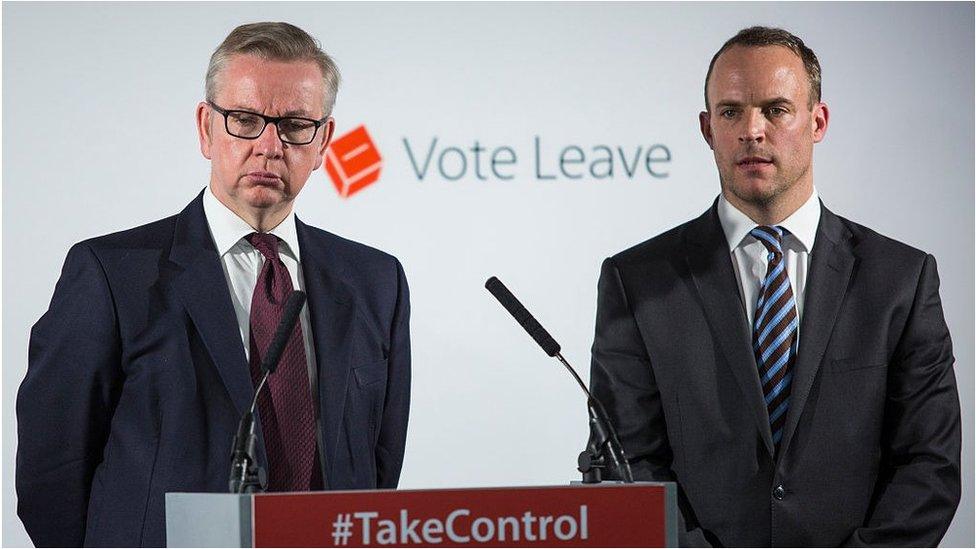
Writing in the Daily Telegraph, external in February 2016 he said the idea that the EU would erect trade barriers after Brexit was "not remotely credible".
As for his colleague Michael Gove, two days before the referendum he told the BBC: "We'll be in a position I think to secure a better deal than the one that we have now.
"No-one is seriously arguing that Britain would be outside that free trade area, that tariff barriers would be erected and that Britain's manufacturing goods would be at a disadvantage."
He had earlier in the campaign written a letter alongside other MPs including Labour's Gisela Stuart, saying that it was "in everyone's interests to do a free trade deal".
Free trade
Mr Gove told the Daily Mail, external in March this year: "We didn't vote to leave without a deal. That wasn't the message of the campaign I helped lead. During that campaign, we said we should do a deal with the EU and be part of the network of free trade deals that covers all Europe, from Iceland to Turkey."
It was not suggested during the referendum campaign that a withdrawal deal would have to be done on the terms of the UK's exit before free trade could be discussed.
Mr Gove consistently voted for Theresa May's withdrawal deal. Mr Raab voted against it twice but voted for it on the third attempt to pass the deal on 29 March.
A search of the Twitter accounts of Mr Raab, Mr Gove and the official Vote Leave campaign reveals no mention in the six months leading up to the Brexit vote of any of the following terms:
"No deal"
"Without a deal"
"World Trade Organization" or "WTO"
Searching more widely, Reality Check found that in the fortnight before the vote, Nigel Farage - who was not part of the official Vote Leave campaign - did say that leaving with no deal would be better than the UK's membership of the EU.



- Published25 July 2019
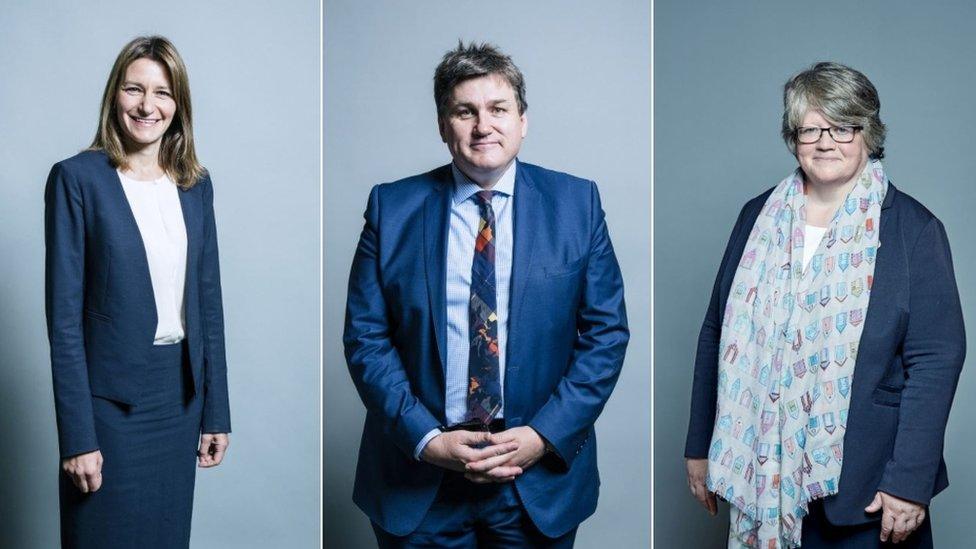
- Published29 July 2019
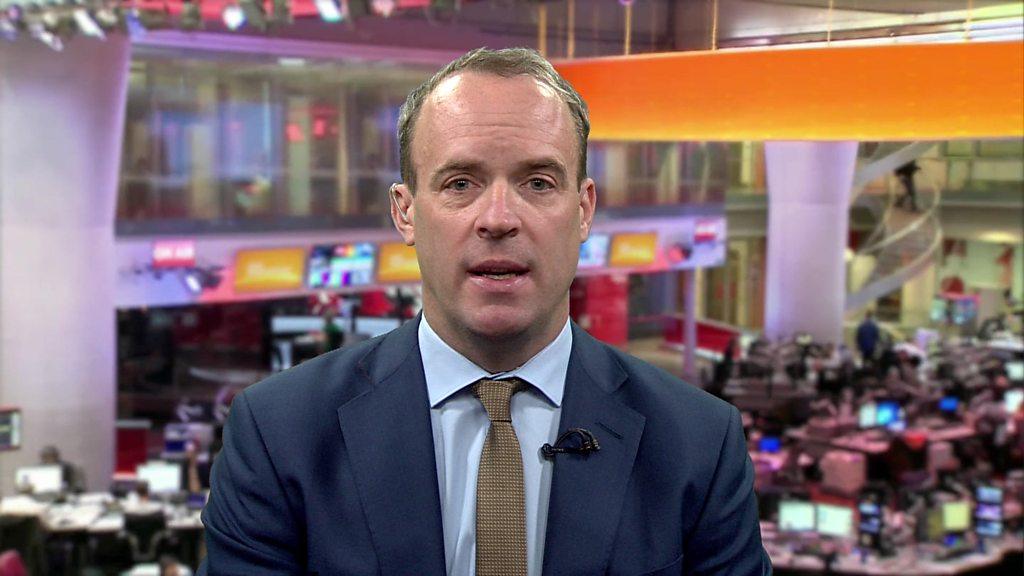
- Published29 March 2019
